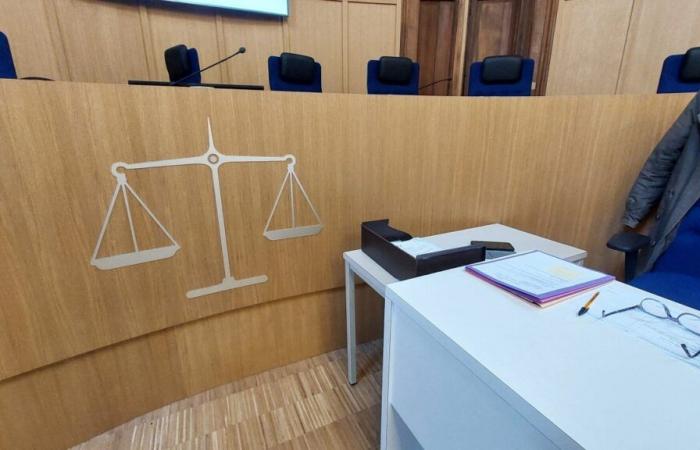Par
Cyrill Roy
Published on
Jan 14, 2025 at 5:00 p.m.
The single-judge hearing on the first Monday of each month is reserved for intra-family violence. Which does not prevent the Évreux court from dealing with it all day long, the phenomenon being rooted in the department.
A teenager growing up amid violence
It is 1:35 p.m. this Monday, January 6, 2025 and the hearing begins with a first emblematic case. That of a couple formed seven years ago and residing in Mesnil-en-Ouche. Laurent, 50, appears in court in a wheelchair. With broken legs, he lives on social minimum between the homes of his mother and his wife. On August 16, the spouses argue for the umpteenth time on a background of alcohol. The motive is, a priori, childish. The TV antenna is malfunctioning. At midday, the son of the defendant's wife (and the latter's son-in-law) watched helplessly as the insults, slaps and shoving took place. So when the scene starts again, the 17 year old teenager call the police.
This is not the first time that Laurent finds himself in court. He has, moreover, already followed a awareness training on domestic violence in 2017. The presiding judge Juliette Demaldent tries to understand where the fifty-year-old is today. “I’m going to max out on alcohol,” he promises. Under treatment, he drinks “less than before” and goes to his first addiction treatment appointment, five months after the incident.
The woman victim is absent from the debates, but it seems that, just like her husband, she wants to continue her married life. Both have a problem with addictions and violence. She drinks rosé, he drinks whiskey. The problem is that a teenager lives in the middle of it all. “It is now that we are giving him an example of how we manage our life as a couple,” warns the magistrate, worrying about finding this young man in court a few years later for similar facts. “He’s a kid we need to protect. » It is in this sense that the victim assistance association (Avede-ACJE) intervenes in order to obtain compensation for the moral damage suffered by the teenager.
The court's mission is difficult: to protect victims, obtain reparation, punish without destroying… In this fragile balance, President Juliette Demaldent demonstrates lots of teachingquestioning more than overwhelming. The defendant will receive ten months with a probationary suspension accompanied by care obligations. “The last step before incarceration,” she warns. The family will be able to move forward in a context that the magistrate hopes is “peaceful”.
Reciprocal blows
At 2:20 p.m., the second file is discussed. A young couple in a relationship that the presiding judge describes as “toxic” is summoned to court for exchanges of blows in an atmosphere of alcoholism (for her) and jealousy. Saint-Georges-Motel. Witnesses describe mutual violence, but the spouse claims to have simply wanted to calm his partner's hysterical attack. Who will still get away with a rascal.
If tensions are still present, the couple claims to want to continue their relationship, if only for the respective children of both parties. The defendants don't really know why they ended up in court. “It’s a misunderstanding. » They want “everything to stop”. After taking the time for dialogue, the magistrate opts for an acquittal.
Denial of violence
The third file is, in its own way, also emblematic. The man who appears for violence against his partner committed in Évreux seems sure of himself: he has nothing to reproach himself for. On October 26, 2024, his partner came home drunk and did not give their children anything to eat. An argument and a slap ensue. “She pushed me, we pushed each other… Honestly, I don’t know what to say. Being in court for a story like that is too much,” says Mohammed, 37, indignant. The man does not seem to have much respect for the judicial institution. Perhaps this is linked to his profile, which deputy prosecutor Thomas Lopez modestly describes as “particular”. With a criminal record showing 30 mentions for violence and drugs.
The scene of violence which took place seems to be downplayed on the part of the victim and the accused. “I wasn’t violent. She hit me a little, I hit her without intention. I apologized,” said the chatty and arrogant thirty-year-old. “We cannot consider that a relationship problem can be resolved by coming to blows,” reframes president Juliette Demaldent. Since the defendant does not see the harm, the magistrate's educational method reaches its limits. The sentence handed down will be four months in home confinement.
Difficult family contexts
Firm when necessary, the court also knows how to recognize when the elements are not sufficient to establish any guilt. This is the case of the only case of violence on the ascendant of the day. A 19-year-old appeared on trial for allegedly beating his mother in Grand-Bourgtheroulde. The hearing highlighted a more complex reality. That of a boy who has barely reached the age of majority, raised by his single mother who seems unstable. On November 4, 2024, as he returned from class, she insulted him. This resulted in an altercation. They fell together. He tried to contain her. “I didn’t want to hurt her,” he insists, describing his mother’s recurring crises. “I know very well that she regrets. But I can’t keep her in my life if I want to develop,” he says. However, it is he who is warned of violence. But the case being too light, the young man benefited from a release.
“Pushing is violence”
The next file doesn't take much time, either. The facts are sadly classic: returning drunk from a wedding, a man attacked his wife, who called for help. “I got scared,” she told the audience, almost apologizing for it coming to this. “It’s okay to call the police,” President Demaldent reassures her. The man admits to having pushed his partner. “Monsieur recognizes the violence, because pushing is violence,” points out the deputy prosecutor. Even though the couple is going through a period of tension, this is the first time that this type of violence has been observed. One too many. It ends with a simple sentence of 120 day fines. “We hope that we will not see you again,” asserts the magistrate. The couple emerges arm in arm, visibly relieved.
In six hours of hearing, the court will have dealt with eight cases of domestic violence. More than through the sentence handed down, President Demaldent will have tried to raise awareness of the seriousness of the facts in a context where certain defendants trivialize the violence when they simply do not deny it. Proof that there is still much to do in society as a whole.
Follow all the news from your favorite cities and media by subscribing to Mon Actu.






